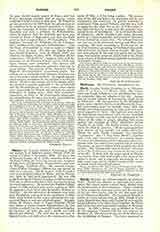

Nardi, JACOPO, Italian historian; b. at Florence, 1476; d. at Venice, March 11, 1563. His father, Salvestro Nardi, belonged to an old Florentine family, originally from the suburbs of the city. Jacopo was an earnest follower of Savonarola, whose death he witnessed. He was attached to the Republican party, under which he held various offices in the State, but nevertheless kept on friendly terms with the Medici after their restoration in 1512, and even composed pageants for them. Having been concerned in the Republican revolution of 1527, he was banished from Florence in 1530, and took a leading part in the efforts of the exiles to return, pleading their cause against the tyranny of Duke Alessandro before Charles V, in 1536. He finally settled at Venice, where he died in poverty. All his contemporaries bear witness to his upright and noble character. Before his exile, Nardi composed two comedies “L’Amicizia” and “I Due Felici Rivali”, together with a few canti carnascialeschi, or carnivalsongs. To a later date belong his political discourses, his translations from Livy and Cicero, and his Life of Antonio Giacomini, an austere soldier of the republic who died in 1517. His “Istorie della città di Firenze” (History of the City of Florence) was written in the last years of his life. It deals with the tragic epoch in Florentine history from 1494 until within a few years of the author’s death, and is especially noteworthy for its high moral tone and its faithful record of the events in which Nardi himself had shared.
EDMUND G. GARDNER

